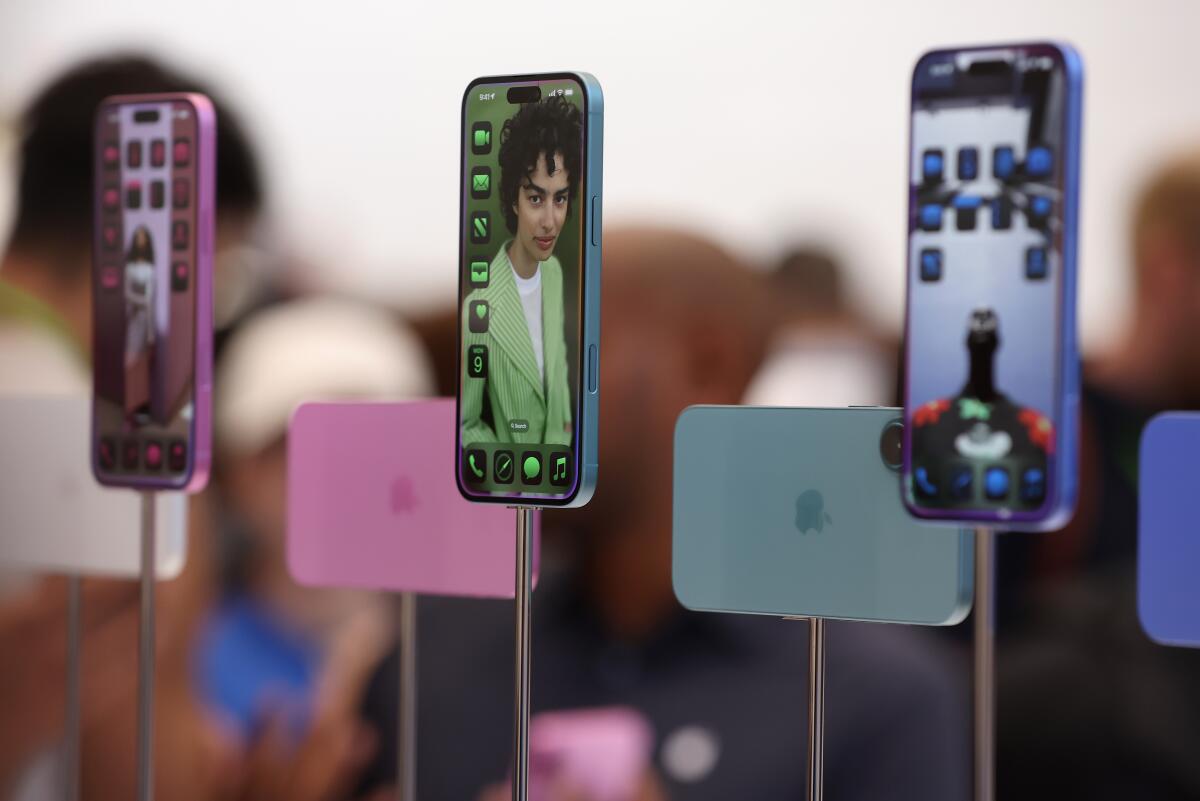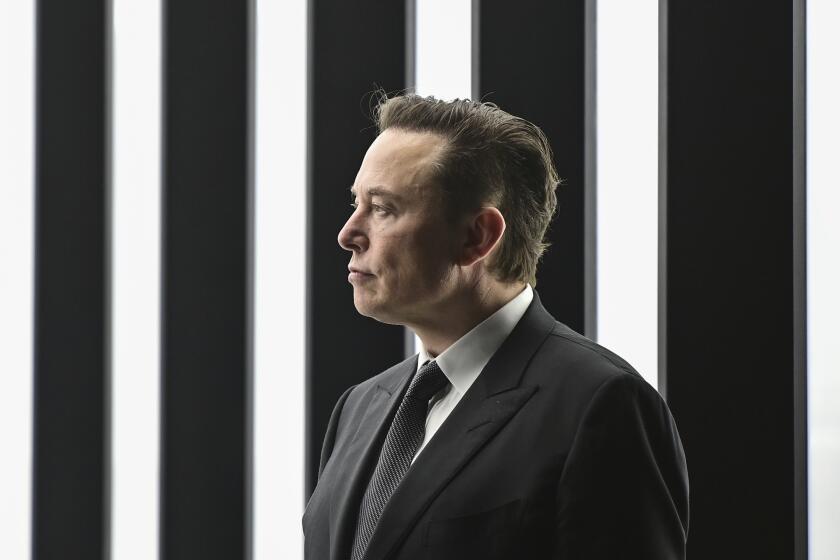Apple touts latest AI tools as it unveils iPhone 16

- Share via
SAN FRANCISCO — Apple on Monday unveiled its newest generation of iPhones, with the usual improvements to their cameras and computing power. But this time, the company touted an additional selling point: artificial intelligence tools.
The new iPhone 16 and 16 Pro will be the first smartphones built from the ground up with Apple Intelligence, the so-called suite of AI tools that are supposed to make the devices and their software better and easier to use.
Apple Intelligence, for example, can make suggestions to users while writing emails, can quickly surface old photos based on a user’s description and assist with scheduling meetings by factoring in driving time. Additionally, the latest version of Siri can pull information collected from OpenAI’s chatbot ChatGPT — with the iPhone user’s permission.
But will Apple Intelligence be enough to convince Apple customers to buy a new smartphone?
“The business model is predicated on the fact that they believe Apple Intelligence is enough to get people to upgrade, and they’re probably going to be right,” said Ray Wang, a principal analyst at Palo Alto-based Constellation Research. “This is really about anything that’s a time-saving category, anything that actually helps you create faster.”
The iPhone 16, 16 Plus, 16 Pro and 16 Pro Max will be available for preorder on Friday and in stores on Sept. 20. The iPhone 16, which has a 6.1-inch display, will start at $799; the 6.7-inch display 16 Plus starts at $899. The 16 Pro, with a 6.3-inch display, starts at $999, and 16 Pro Max, with a 6.9-inch display, starts at $1,199. Apple Intelligence will be available starting next month, including on older devices iPhone 15 Pro and 15 Pro Max.
Wang estimates Apple has an iPhone install base of 1.3 billion, with 240 million of that base upgrading to the next-generation machines.
Apple announced new artificial intelligence-powered tools, including a partnership with OpenAI that allows Siri to surface answers from ChatGPT.
The Cupertino, Calif.-based iPhone maker has touted Apple Intelligence as more mindful of customer privacy than its AI competitors. Apple Intelligence uses on-device processing. For requests that require use of the cloud, the devices “do not talk to a server unless its software has been publicly logged for inspection,” according to the company. The data are not retained or exposed.
“The next generation of iPhone has been designed for Apple Intelligence from the ground up,” Apple Chief Executive Tim Cook said during a presentation at the company’s headquarters. “It marks the beginning of an exciting new era.”
Apple first announced Apple Intelligence at its Worldwide Developers Conference in June. It was immediately criticized by Tesla CEO Elon Musk, who runs his own artificial intelligence company that competes with OpenAI. Musk expressed concern that a partnership between Apple and OpenAI could pose security risks.
Some security researchers including Alex Stamos, chief information security officer at Mountain View, Calif.-based cybersecurity company SentinelOne and former chief security officer at Facebook, have pushed back on Musk’s allegations.
The Tesla and SpaceX leader’s beef with OpenAI flared up again after Apple unveiled its plans to use ChatGPT to support some of its AI features. Apple said privacy is a key component of its entry into the space.
Over the years, the capabilities of AI have significantly advanced, giving digital chatbots the ability to tell bedtime stories to children, detect emotions in human users and offer suggestions for breathing exercises. In the entertainment industry, tools such as OpenAI’s Sora have caused excitement among some filmmakers, who say they can be used to test bold ideas and save money; but they also fear that such tools will displace many workers.
On Monday, Apple executives touted AI’s potential benefits for consumers.
The iPhone 16, with a 48-megapixel camera, will have new software and hardware that will improve the way customers use cameras on their phone. They can click and hold the camera’s control button to take a photo of a dog and find out what its breed is, or snap a picture of a flier marketing a local event and add it to their calendar.
Siri also is able to contextualize information. For example, it’s possible for users to tell iPhone 16’s Siri to send a specific friend from their contacts photos from a Saturday barbecue.
The iPhone remains Apple’s most popular product, representing 46% of the company’s sales in its fiscal third quarter. But revenue for Apple’s smartphones declined earlier this year due to weaker sales in China. Some analysts believe that the new AI-powered iPhone 16 and 16 Pro will change that.
“Our view is betting against Cook and Cupertino into an AI-driven supercycle led by iPhone 16 and Apple Intelligence is the wrong move for investors as the renaissance of growth returns to the Apple story,” Daniel Ives, a managing director with Wedbush Securities, said in an Aug. 1 report. Ives has an “outperform” rating on the stock.
Consumers may see lower prices on app subscriptions and purchases if the Department of Justice succeeds in its lawsuit against Apple, consumer advocates said.
Apple also announced that its wireless earbuds, AirPods Pro 2, will offer hearing tests and could serve as a hearing aid for people with mild to moderate hearing loss this fall in more than 100 countries and regions, including the U.S. The company said it is waiting to receive marketing authorization from health authorities.
There were also additional features for the next-generation AirPods 4, allowing users to have clearer phone calls even when walking through noisy environments. AirPods 4 will be available in stores on Sept. 20.
The company also shared news that its Apple Watch Series 10 will have a larger display and faster-charging battery. Apple Watch Series 10 starts at $399 and will be available in Apple stores on Sept. 20.
More to Read
Inside the business of entertainment
The Wide Shot brings you news, analysis and insights on everything from streaming wars to production — and what it all means for the future.
You may occasionally receive promotional content from the Los Angeles Times.














